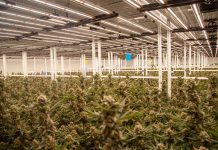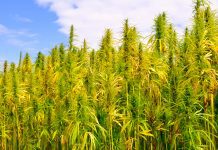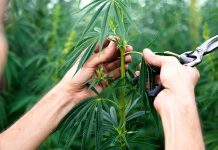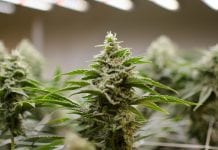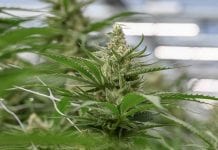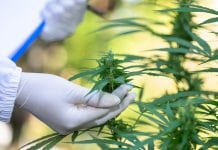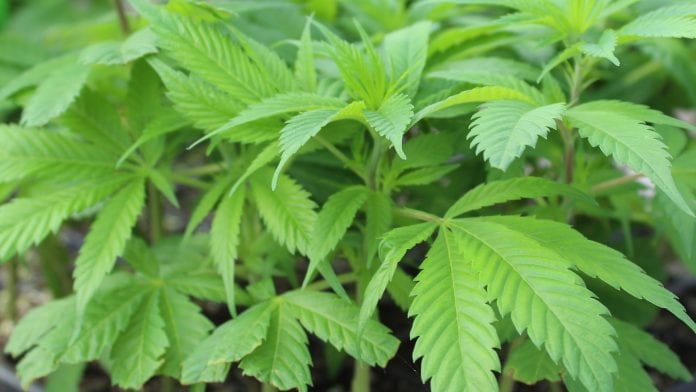
Adivina is dedicated to bringing the proven cultivation benefits of tissue culture propagation to both the cannabis and hemp industries.
Adivina Biosciences was founded by seasoned horticultural scientists and professionals working together to raise the standards of science, business and trust within the cannabis and hemp industries. Adivina is dedicated to bringing the proven cultivation benefits of tissue culture propagation to both the cannabis and hemp industries.
Plant tissue culture, also known as micropropagation, is widely used in the commercial horticultural industry for the mass production of clonal plants. Though starting stock is relatively more costly than traditional seed propagation, the multitude of benefits conferred by micropropagated young plants expands the potential to significantly increase cultivator return on investment (ROI).
Key qualities of Adivina’s tissue culture propagated hemp plants:
- Elite: carefully selected genetics to optimise architecture, growth, cannabinoid content and biomass;
- Clean: virus-indexed, disease and pest free;
- Resilient: Adivina’s plants are more resilient and better able to respond to environmental stressors such as pest, chemicals and diseases;
- Predictable: uniform crop growth and cannabinoid profiles produce more predictable harvest timing and testing;
- Operationalised: crop uniformity allows for optimal operationalisation of hemp production, resulting in a consistent age for nutrient application and mechanisation for harvest; and
- Farmer increased ROI: Higher biomass per plant and acre, higher quality biomass, increased revenue and profitability.
Tissue culture propagation is similarly superior to vegetative propagation. Cannabis and hemp are annual plants. Traditional vegetative propagation keeps mothers in a perpetual state of vegetative growth for years. Any stress that the mother stock experiences – including drought, nutritional deficiencies, unseasonal temperature changes, pests and disease – can induce epigenetic modifications, changes to gene expression.
Any clones harvested from stressed mother stock will inherit that ‘stressed programming’; resulting in diminished genetic potential, reduced yield and compromised resistance to diseases and pests. Tissue culture offers a form of genetic rebooting, returning the plant to its juvenile genetic potential and thereby strengthening its natural ability to defend against environment assault.
Cannabis is incredibly powerful in terms of its medicinal properties, but unfortunately it is highly susceptible to many pests and pathogens. Tissue culture propagation allows the breeder to conduct pathogenic disease testing which provides the entire industry with a higher level of scientific certainty and analysis.
Hemp planting dynamics changed overnight
With the expanding international legalisation of hemp flower extract, virtually overnight everything changed for the hemp cultivator. The hemp flower has taken centre stage. Hemp flower provides a rich source of CBD, a cannabinoid used to enhance wellness and treat a wide range of ailments. Hemp profitability now centres on the previously ignored flower. Maximising flower biomass and uniformity has become the basis of profitability.
This flower-centred profitability is demonstrated by the significant change in hemp pricing that has taken place. Hemp biomass pricing protocols changed from measuring dollars per pound to dollars per percentage of CBD potency per pound. In order to optimise crop pricing, flower potency profiles, including CBD, CBG, and THC, must be expertly managed.
CBD flower crops which fail to achieve the anticipated CBD percentage profile will result in thousands of dollars lost per acre; or worse, THC levels above the regulatory limit could result in total crop failure. Plant gender must also be carefully controlled or managed to ensure all female crops, in order to prevent flower pollination. Hemp cultivators face a far greater number of variables than ever before; and these added challenges have them questioning their traditional seed planting practices.
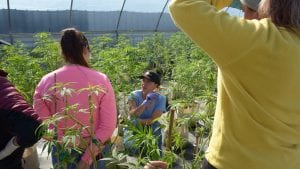
The hemp rush: boom or bust?
If these increased planting variables weren’t enough, cultivators are also challenged to find reliable starter CBD hemp planting materials. In any industrial boom like hemp, there are great opportunities and great pitfalls. While there are good breeders, there are also many opportunists who have rushed in to take advantage of the growing hemp market demand. These unqualified breeders are offering seed and stock fraught with staggering quality variations in terms of seed gender, architecture, potency, biomass, colour, rate of growth and development; and seed-coat diseases.
Not surprisingly, the US 2018 and 2019 seasons were plagued by crop failures associated with unpredictable seed and stock. More than half of CBD hemp crops cultivated in Hawaii in 2018 were forced to be destroyed due to THC levels above federal limits. Partial or complete loss of CBD production resulted from flower fertilisation due to the presence of male plants; and seed-coat diseases such as the tobacco mosaic virus (TMV) and Hop Latent Viroid (HpLV), often introduced by inexperienced growers with sub-optimal cultivation practices, have resulted in crop losses and significantly reduced crop yields.
These unpredictable and unreliable starting materials have resulted in the loss of millions of dollars of anticipated yield. Adivina’s young plants are helping to meet cultivators’ immediate need for a large supply of stable, reliable, virus-indexed (clean) all female CBD hemp plants with consistent growth habits and cannabinoid yields. The need for predictability and quality shine a bright light on the unique benefits of Adivina’s tissue culture propagated elite plant stock.
Predictability, reliability, quality
Nature’s job is to introduce variation; after all it is the currency of adaptation and survival. The cultivator’s job is to contain that variation and deliver a predictable and reliable crop. Adivina’s industry leading breeding and cultivation programme provides that reliability and delivers the elite plant stock which in turn drives our customers’ profitability.
Adivina hunts for the very best genetics we can find to meet our customers’ and market needs. We then grow these plants out to maturity, tracking growth rates, plant architecture, biomass yield and resiliency. Plants with the optimal genetic profiles are then taken through our tissue culture protocol to test for and clean out any pathogens as well as to reboot genetic potential.
These ‘elite plants’ become the foundation of our tissue culture propagated plant offerings. Adivina provides its customers with certificates of analysis (COAs) not only on cannabinoid and terpene profiles, but on pathogens as well. Adivina is committed to educating and elevating the industry regarding the devastating impact of pathogenic diseases. Our customers are armed with the full knowledge of what they have purchased and the yield potential of their crops.
Preventing virus and disease
Diseases that can hide in seed coats, such as the tobacco mosaic virus and Hop Latent Viroid, can be introduced by inexperienced growers using poor cultivation practices, resulting in crop losses and significantly reduced crop yields.
Because few testing standards are in place in the cannabis and hemp industries, virus and pathogens tend to persist in crops for years through vegetative propagation and lack of prevention and intervention strategies. Tissue culture propagation is a mitigating strategy to ensure clean reliable stock.
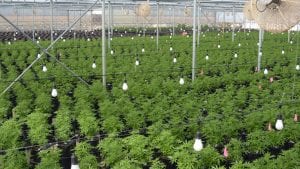
The advantages of tissue culture
Hemp provides a lucrative crop opportunity, as long as there is a robust and healthy harvest. Profitable crop yield is a game of numbers, and every single percentage point counts. Seeds which do not meet the projected plant characteristics can drop crop value precipitously. As prices are driven down and margins get tighter, cultivators must secure a reliable supply chain of healthy robust planting materials. This need for planting stock reliability is moving hemp in the direction of many modern commercial crops, towards micropropagated plants.
Although micropropagation is not new, it does deliver a new path to profitability for hemp cultivators. Tissue culture is a collection of techniques which enable the cultivator to grow plant material in vitro, or in culture. Because plants are grown in culture, in sterile containers and culture labs, it is sometimes referred to as sterile propagation.
Micropropagation came into commercial prominence in the 1950s for orchid production. Since that time, it has been broadly adopted in the agricultural and horticultural industries from flowers to fruit, vegetables to hops; and now cannabis and hemp.
Because tissue culture requires less space and personnel than traditional vegetative propagation, it enables the commercial nursery and related industries to increase efficiency and profits. Beyond the operational efficiencies, it offers genetic revitalisation as well as cryopreservation.
Adivina is a leading international advocate for and expert in cannabis and hemp tissue culture propagation. The Adivina team works around the clock and around the world championing the benefits of tissue culture; not just for cultivation success, but also as a means of identifying and stopping the devastating spread of so many seed-coat viruses in the industry.
Adivina’s customer commitment
Adivina is committed to the success of each of our customers. Where other companies conclude their interactions with a sale, Adivina’s long term relationship with our customers starts with the plant purchase.
Adivina experts work with our customers to ensure that they have selected the right plants for their climate and growing conditions. We support our customers throughout the growing season and the multitude of challenges that nature – and their employees – throw at them, helping our customers devise their testing and harvest strategies to ensure regulatory compliance. Our customers’ success is our success.
Contact Adivina to put the power of predictability to work for you.
Dr Hope Jones
Adivina BioSciences LLC
+1 520 245 4266
hjones@ecscience.com
This article will appear in the second issue of Medical Cannabis Network which is out in April. Click here to get your free subscription today.



